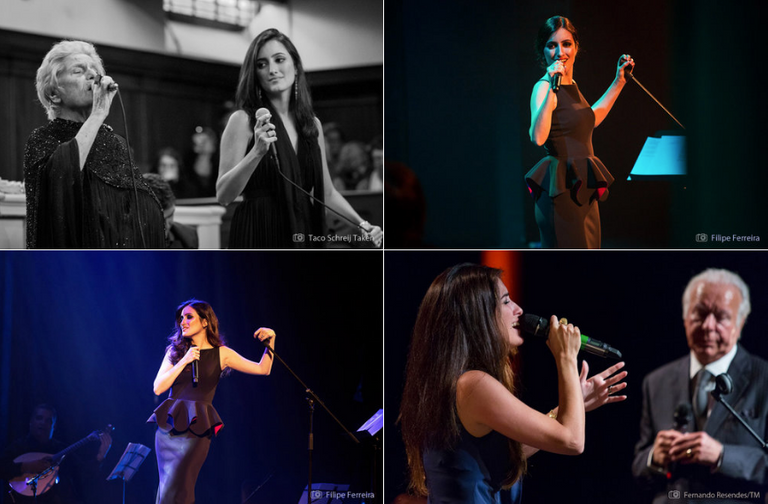
When did you begin to sing Fado?
I sang Fado accompanied by guitarists for the first time when I was 13. But ever since I can remember, Fado was always playing in the background in our home. My father has always been very passionate about Fado and would take me to local Fado nights, and from those experiences and the albums he had at home I got an understanding of the genre. But it wasn’t until I performed in front of an audience that I learned to fully appreciate and decided to pursuit it. I was hooked immediately because I realized that Fado is something that you feel and deliver, and so much more than any “technique” I could ever learn.
What has it been like to grow up as a first-generation Portuguese American, singing a style of music that has its roots in the old world?
Fado has given me so many unforgettable and unique experiences that have allowed me to meet incredible people and visit inspiring places. But what makes Fado so powerful is although its roots trace back to the “old world,” it’s evolved to stay relevant and pass the test of time with the respect and appreciation for our poets and song writers in Portugal. As a first-generation Portuguese American singing to immigrants or descendants feels like home, because I can relate to the nostalgia that we receive from Fado being on this side of the ocean. And singing to people who aren’t of Portuguese descent that just want to experience a part of our culture is the ultimate reward as a singer of this genre.

Throughout its history Fado has served the Portuguese people to express difficult emotions such as pain, longing, melancholy, and mourning. How do you relate to this role as an artist/performer today?
Fado is therapeutic in that way. As I grow older and live my life, I identify evermore with a never ending list of Fados that relate to the situations I face. But Fado is generally associated with the deep and heavy topics you mentioned, despite there being so many uplifting Fados. Fado speaks of life. So as an artist, my repertoire reflects all the emotions I have experienced, whether it be about heartbreak or love. Emotion is the driving force behind Fado, so if I haven’t experienced what I’m singing about, then my Fados fall short.
What is the concept behind your latest album, Fado Além?
Fado Além translates to 'beyond Fado'. A Fado album that goes beyond the Portuguese borders and Fado’s traditional sound. It’s an album with many writers and composers I truly admire, and musicians that inspire me beyond words. The songs include topics regarding love, jealousy, heartbreak, longing, reflection, curiosity, and even Lisbon and New York!
What do you wish to offer the world through singing Fado?
For me, Fado usually expresses the feelings I often times have difficulty finding the words to explain. I hope to share and spread that and I hope that if I keep creating and singing songs that people can relate to, they too will find it to be therapeutic, and feel a connection to the music that dispels any loneliness that person may have been feeling. I guess, simply speaking, a sense of community.
Hi! I am a robot. I just upvoted you! I found similar content that readers might be interested in:
https://www.theautumnsalon.com/aswritings/nathaliepires
wow stunning :)